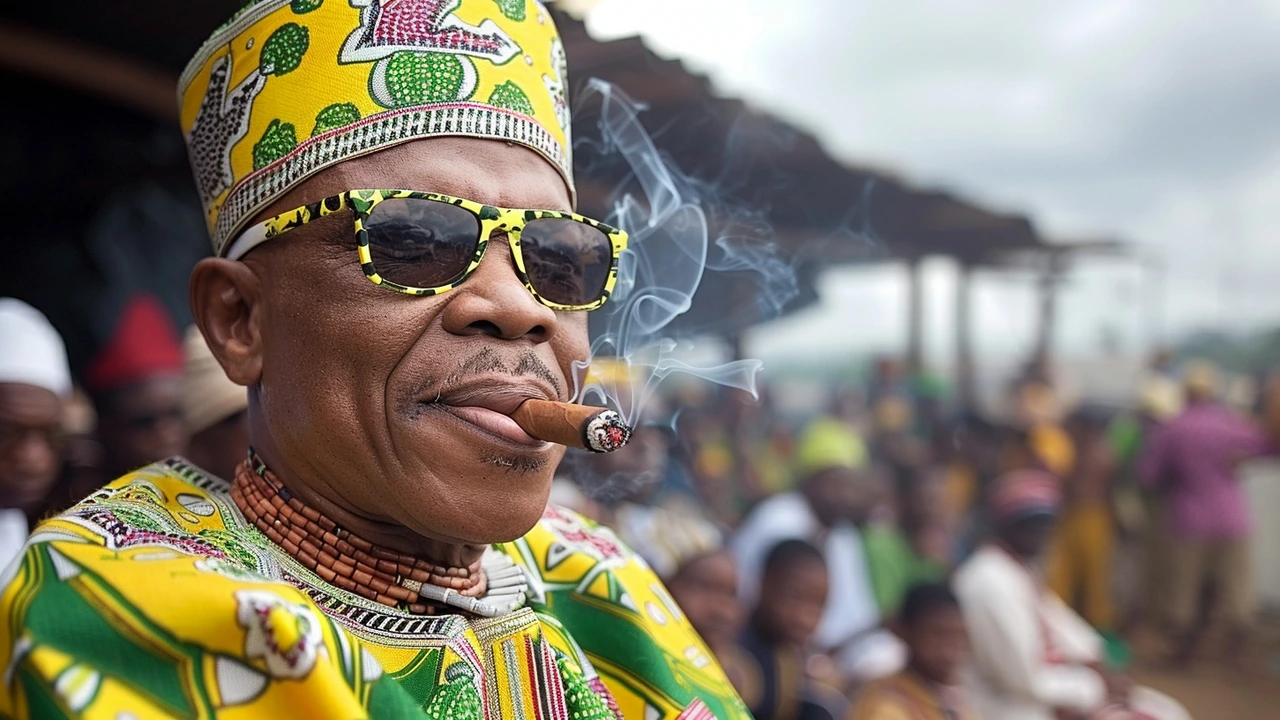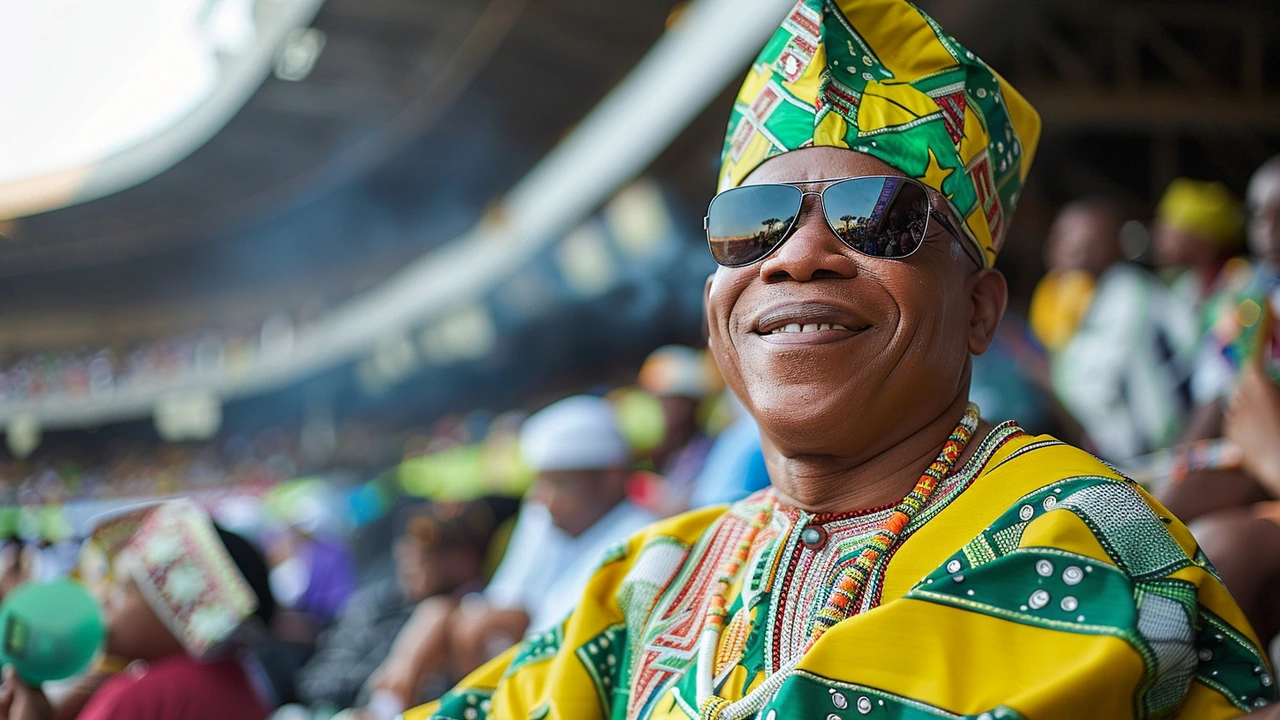Farooq Oreagba's Ojude Oba Moment: More Than Just Sartorial Elegance
The 2024 Ojude Oba Festival in Ijebu, Ogun State, was a spectacular event, teeming with grandeur and cultural pride. Yet, one individual managed to capture the spotlight: Farooq Oreagba. Known professionally as an investment banker, Farooq took the festivities by storm with his eye-catching green and yellow Asooke Agbada and a regal horseback entrance that left onlookers in awe. His impeccable style and dignified demeanor in a viral photograph earned him the fitting title, 'King of Steeze.' But beyond his splendid attire, there lies a man with a compelling story, deeply rooted in family traditions and personal battles.
Continuing a Family Legacy
In an interview with Arise News, Farooq opened up about the significance of Ojude Oba in his life, revealing that this wasn't his first time attending the festival. In fact, Farooq has been a regular presence at the Ojude Oba Festival for the past 15 years, upholding a family tradition initiated by his grandfather. "My family has always been dedicated to attending Ojude Oba, and it's become a symbol of our unity and culture," Farooq said. Their dedication to this annual event in Ijebu isn't merely about participation; it's about honoring their heritage and instilling the same values in the younger generations.
Farooq emphasized how the cultural richness and vibrancy of Ojude Oba have deeply influenced his life. "It's not just a festival; it's a part of who we are," he explained. The festival, celebrating the Ijebu people's history and royal lineage, has always been a focal point for the Oreagba family. Farooq's grandfather, a respected community leader, was one of the pioneers in their family to embrace and participate actively in the festival. His involvement paved the way for subsequent generations, including Farooq, to take pride in their cultural identity.
The Meaning Behind the Tattoos
While his festival appearance has gained widespread attention, few know the personal significance behind Farooq's tattoos. During the Arise News interview, Farooq shared that each tattoo on his body tells a story. "Every tattoo I have is a piece of my life, a marker of important moments and lessons I've learned along the way," he stated. Farooq talked about a particular tattoo of a phoenix on his arm, symbolizing rebirth and resilience, which he got after surviving a major life crisis. Another tattoo, depicting traditional Yoruba symbols, serves as a testament to his African roots and his family's enduring connection to their heritage.
"Tattoos, for me, are more than just body art; they are expressions of my journey, my struggles, and my triumphs," Farooq explained. He recounted how he diligently selected each design to reflect pivotal stages of his life, including his travel experiences, key relationships, and personal growth. Farooq noted that while some people might view tattoos as mere decorations or rebellious acts, for him, they are a source of strength and motivation. They remind him of his fortitude and the lessons he has gleaned from life’s challenges.
The Battle with Cancer
One of the most poignant moments in Farooq's interview was when he spoke about his battle with cancer. Diagnosed in 2014, Farooq described the diagnosis as a life-altering event that forced him to rethink his priorities. "Being told you have cancer is like having your world turn upside down. Everything you thought was important suddenly becomes secondary," he said, his voice tinged with emotion. It was during this tumultuous time that Farooq gained a new perspective on life, cherishing moments with family and recognizing the value of time.
Farooq underwent rigorous treatment and shared the psychological toll it took on him. "Battling cancer is as much a mental struggle as it is a physical one," he remarked. He found solace in his family's unwavering support and the cultural practices he'd grown up with, such as attending the Ojude Oba Festival. Farooq believes that these experiences acted as a sanctuary, providing him with the emotional strength needed to continue his fight against the disease. The overwhelming love and encouragement from his family and community became his driving force during his most challenging days.
Today, Farooq is in remission, but the experience has left an indelible mark on him. He hopes that his story will inspire others who are going through similar battles. "Cancer may have changed my life, but it didn't take my spirit. I choose to live each day with purpose and joy," he declared. Farooq says that being crowned 'King of Steeze' at this year's festival feels like a testament to his resilience and his enduring will to embrace life to the fullest.

A Reflection of Culture and Personal Triumph
Farooq Oreagba’s story is a remarkable blend of cultural celebration and personal triumph. By attending the Ojude Oba Festival every year, he not only honors a cherished family tradition but also symbolizes the strength of community and cultural continuity. His vibrant attire and the grace with which he carried himself during the festival are a testament to his inner strength and the battles he has fought.
His tattoos, far from being mere decoration, serve as a narrative of his life's journey. Each inked mark is a testament to a significant chapter in his life, reflecting his resilience, heritage, and personal growth. Farooq’s openness about his battle with cancer sheds light on the depth of human endurance and the importance of family support in overcoming life's adversities.
As Farooq sat down with Arise News, his story unfolded not just as one of personal achievement, but as a tale of inspiration for many. His journey resonates with anyone who has faced overwhelming challenges and emerged stronger. Whether it’s the dignified portrayal of his cultural heritage, the deeply personal narrative of his tattoos, or his courageous battle with cancer, Farooq's story is one that reminds us all of the indomitable human spirit.
The 'King of Steeze' might be a title born out of a viral moment, but it encapsulates Farooq Oreagba's essence. It represents his elegance, his heritage, and his unyielding spirit in the face of life's challenges. As the Ojude Oba Festival draws to a close and the dust settles, Farooq's story will continue to inspire, reminding us all that true nobility comes from within.

5 Responses
Your glorified "steeze" is nothing but a shallow display of materialism.
Wake up!!! The globalist elites are using viral fashion moments like Farooq's to distract us from the real agenda!!!
The narrative of Farooq Oreagba reads like a modern myth woven from threads of heritage and adversity.
His recurring presence at Ojude Oba functions as a ritual reaffirmation of communal identity, echoing the ancient rites that bind a people together.
Each stitch of his Asooke Agbada can be seen as a visual poem, speaking louder than any spoken declaration.
Yet the true poetry lies beneath the skin, where inked symbols map the cartography of a lived experience.
The phoenix tattoo, for instance, is not merely a decorative emblem but a reminder of the cyclical nature of destruction and rebirth.
In the same vein, the Yoruba motifs etched onto his arm serve as a bridge between personal memory and collective memory.
When he recounts his battle with cancer, the story transcends individual suffering and becomes a testament to the resilience of the human spirit.
Illness, in its starkest form, strips away the superfluous and forces a reevaluation of what truly matters.
For Farooq, the support of family and the continuity of tradition acted as a scaffolding upon which he could rebuild.
This interplay between cultural anchor and personal fortitude illustrates how external narratives can shape internal healing.
Moreover, his openness about vulnerability challenges the stereotypical stoicism often associated with success in the financial sector.
By sharing his scars-both visible and invisible-he democratizes the conversation about health and masculinity.
The viral moment of being crowned “King of Steeze” thus becomes a paradoxical platform: it celebrates aesthetic excellence while also spotlighting deeper existential themes.
In a world increasingly obsessed with surface, such a layered story invites us to look beyond the glitter.
Ultimately, Farooq’s journey reminds us that legacy is not only inherited but actively cultivated through acts of courage and remembrance.
While I appreciate the philosophical depth presented, it is also essential to acknowledge the human element that undergirds such narratives. The interplay between tradition and personal adversity offers a compelling illustration of resilience, and it is heartening to see this perspective articulated with such care.
Your observations are well‑phrased and add valuable nuance to the discussion. I concur that recognizing both cultural and individual dimensions enriches our understanding.